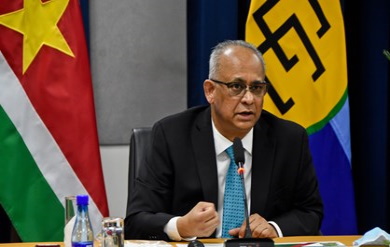
CMC – In Indonesia the Caribbean Community (CARICOM) grouping has called on the world’s most developed economies to help establish an action plan on food and energy security, agricultural innovation and climate action.
Addressing the G20 Summit, Suriname’s Foreign Affairs, International Business and International Cooperation Minister, Albert Ramdin, said that solutions in isolation will never be sufficient.
“Food cannot become a luxury item and everything should be done to prevent that. Food security challenges give rise to future conflicts or battlegrounds, as the numbers of fertile agricultural land are declining, also due to climate change,” Ramdin told the conference as he deputised for CARICOM chairman and Suriname President, Chandrikapersad Santokhi, who “regretfully … was unable to personally attend due to urgent matters of state and sends his regrets”.
Ramdin said that food and energy security are at the heart of societies and economies globally, noting that a Report on the State of Food and Nutrition Security, had warned that by 2021, at least 40 per cent of people in Latin America and the Caribbean will face food insecurity.
He said this would be 10 per cent more than for the rest of the world and that the situation has been exacerbated by rising inflation, fertilizer shortages and the continued rise in interest rates.
Ramdin said the situation offers no consolation to potential investors.
“This is not sustainable and therefore it is critical that all countries, and the international financial institutions (IFI’) commit to develop a dedicated global plan of action to manage, propel recovery and growth in the areas of food security, climate, agricultural innovation, and sustainable productivity growth.”
Ramdin said that all these themes and policy areas are interrelated.
“Therefore, solutions in isolation will never be sufficient. A more integrated, effective and comprehensive mechanism of technical and financial assistance should be adopted,” he said, adding that CARICOM has developed a comprehensive response and roadmap to combat the challenges and grow the region’s agriculture sector.
He said the Food Import Bill Reduction programme, aims at reducing the region’s food import bill by 25 per cent by the year 2025.
Regarding energy security, Ramdin said the CARICOM energy agenda seeks to address the four dimensions of energy security, ensuring that energy services are available, reliable, affordable, and sustainable for citizens.
He said the position of the regional bloc is to optimize indigenous sources of energy to drive the region’s sustainable development, with a judicious mix of traditional and renewable energy resources, noting also that the region is not immune to international economic and political developments.
Ramdin said the geopolitics of energy affecting supply and demand undermines a post-COVID-19 pandemic economic recovery and creates more poverty around the world through surging commodity prices, rising inflation, higher supply chain costs, exacerbated by the high debt burden in many of the member states.
He said the region is committed to the transformation to carbon-free economies and the financing of the energy transition remains a crucial point for the member states.
Ramdin said that there is a need for innovative financing mechanisms that are appropriate, affordable and accessible for the small energy markets in the CARICOM, such as the Caribbean Resilience Fund.
“We also expect that the CARICOM energy producers will not be treated differently than the current energy producers. That would not only be unfair and unjust, but also blocking the uplifting of these developing economies,” Ramdin added.





More Stories
Plans for Royalton CHIC Barbados unveiled
BMS issues Flash Flood Watch
Man dies following stabbing incident